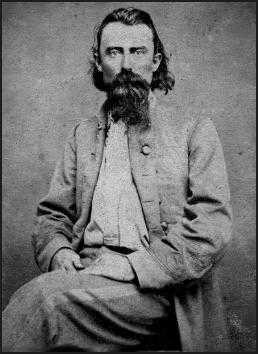Joseph O. Shelby

Joseph Orville "Jo" Shelby (December 12, 1830 – February 13, 1897) was a noted Confederate cavalry general in the Trans-Mississippi Theater of the American Civil War.
Early life and education
Shelby was born in Lexington, Kentucky, to one of the state's wealthiest and most influential families. He lost his father at age 5, and was raised by a stepfather. Shelby attended Transylvania University and was a rope manufacturer until 1852. He then moved to Waverly, Missouri, where he engaged in steamboating on the Missouri River and in running a hemp plantation. He was one of the largest slaveholders in the state. During the "Bleeding Kansas" struggle, he led a company on the pro-slavery side.
The war years
In 1861, Shelby formed a cavalry company and was elected its captain, leading it into battle at Wilson's Creek. Promoted to colonel, he commanded a brigade at Prairie Grove. Shelby led his "Iron Brigade" of Missouri volunteers on what was to be the longest cavalry raid of the war at that time, Shelby's Great Raid. Between September 22 and November 3, 1863, Shelby's brigade travelled 1,500 miles through Missouri, inflicting over 1,000 casualties on Union forces, and capturing or destroying an estimated $2 million worth of Federal supplies and property. He was promoted to brigadier general on December 15, 1863, at the successful conclusion of his raid.
In 1864, Union General Steele's failure in the Camden Expedition (March 23–May 2, 1864,) can in no small part be laid to Shelby's brilliant and determined harassment, though in concert with other Confederate forces. Ultimately that Federal force was forced back to Little Rock upon the final destruction or capture of its supply trains at Mark's Mill.[1] Reassigned to the Clarendon, Arkansas area, Shelby accomplished the rare feat of capturing a Union tinclad USS Queen City, which was immediately destroyed to avoid recapture.[2] As summer was ending Shelby then commanded a division during Sterling Price's Missouri raid. He distinguished himself at the battles of Little Blue River and Westport, and captured many Union held towns, including Potosi, Boonville, Waverly, Stockton, Lexington, and California, Missouri.
Shelby's adjutant was John Newman Edwards, who later as editor of the Kansas City Times was to almost single handedly create the anti-hero legend of Jesse James.
After Robert E. Lee's army surrendered in Virginia, General Edmund Kirby Smith appointed Shelby a major general on May 10, 1865. However, the promotion was never formally submitted, due to the collapse of the Confederate government.
Post war
In June 1865, rather than surrender, Shelby and approximately 1,000 of his remaining troops rode south into Mexico. For their determination not to surrender, they were immortalized as "the undefeated". A later verse appended to the angry post-war Confederate anthem, "The Unreconstructed Rebel" commemorates the defiance of Shelby and his men:
- "I won't be reconstructed, I'm better now than then.
- And for a Carpetbagger I do not give a damn.
- So it's forward to the frontier, soon as I can go.
- I'll fix me up a weapon and start for Mexico."[3]
Their plan was to offer their services to Emperor Maximilian as a 'foreign legion.' Maximilian declined to accept the ex-Confederates into his armed forces, but he did grant them land for an American colony in Mexico near Veracruz. The grant would be revoked two years later following the collapse of the empire and Maximilan's execution. Reportedly, Shelby sank his battle flag in the Rio Grande near present-day Eagle Pass (TX) on the way to Mexico rather than risk the flag falling into the hands of the Federals. The event is depicted in a painting displayed at the Eagle Pass City Hall. The memory of Shelby and his men as "The Undefeated" is used as a distant basis for the 1969 John Wayne-Rock Hudson film by the same name.[4]
The historian Edwin Adams Davis of Louisiana State University in Baton Rouge penned Fallen Guidon: The Saga of Confederate General Jo Shelby's March to Mexico, first published in 1962 and reprinted a year after Davis' death in 1995. Davis was a descendant of one of Shelby's men.[5]
Shelby returned to Missouri in 1867 and resumed farming. In 1883, Shelby was a critical witness for fellow ex-Confederate Frank James at James' trial.[6] He was appointed the U.S. Marshal for the Western District of Missouri in 1893, and retained this position until his death in 1897. He died in Adrian, Missouri, and is buried at Forest Hill Cemetery, Kansas City.
See also
- List of American Civil War Generals (Confederate)
Notes
- Eicher, John H., & Eicher, David J., Civil War High Commands, Stanford University Press, 2001, ISBN 0-8047-3641-3.
- Biography from History of U.S. Marshals
- O'Flaherty, Daniel C. "General Jo Shelby:Undefeated Rebel," (University of North Carolina Press) 1954; ISBN 0-8078-4878-6; republished, 2000.
References
- ↑ Flaherty General Jo Shelby, Undefeated Rebel pg 209-211
- ↑ Confederates Sink Ironclad near DeValls Bluff » The Arkansas News
- ↑ with variations by Ry Cooder for the 1980 film, "The Long Riders": http://www.rycooder.nl/pages/ry_cooder_the_long_riders_chords_lyrics.htm
- ↑
- ↑ Edwin Adams Davis, Fallen Guidon: The Saga of Confederate General Jo Shelby's March to Mexico. College Station, Texas: Texas A&M University Press, 1995, ISBN 978-0890966846. Retrieved October 1, 2013.
- ↑ Paul I. Wellman, "A Dynasty of Western Outlaws", 1961.
External links
- "Joseph O. Shelby". Find a Grave. Retrieved 2008-02-13.
|